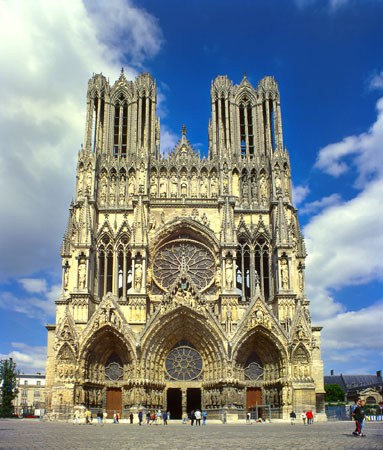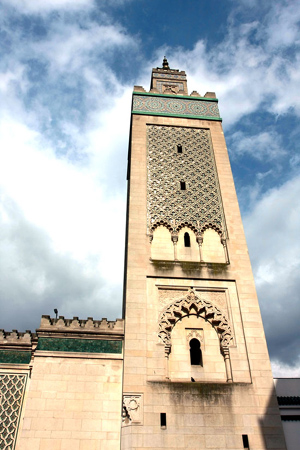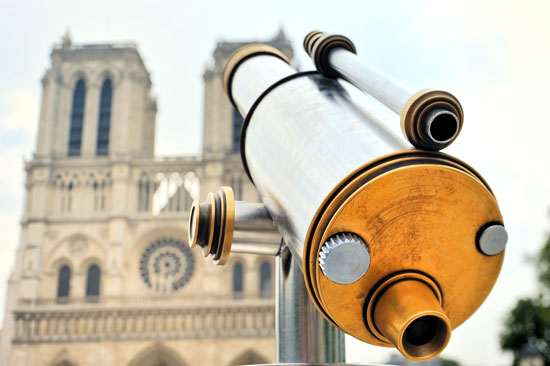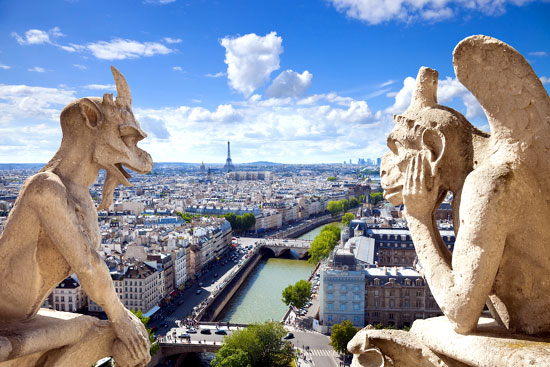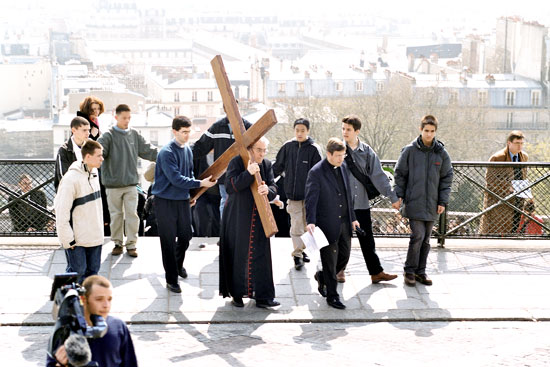Culture and Society: Religion Overview
Religions of the Country
Roman Catholicism is the predominant religion in France and is followed by most of the population. Muslims are the second largest group in the country, while Protestants, Jews, Buddhists, and Sikhs each constitute a very small percentage. People with no religious affiliation constitute approximately 5 percent of the population. Other minority religious groups include Christian Scientists and the Church of Latter-day Saints (Mormons).
Basic Tenets
The Catholic Church believes itself the legitimate successor to the ministry of Jesus Christ through uninterrupted apostolic succession from St. Peter to the present Pope. Like most other Christian faiths, Catholicism is both monotheistic and trinitarian, following one God in three forms, the Father, the Son, and the Holy Spirit. It holds that Jesus Christ, the Son, died and rose from the dead to redeem humanity from its sins. It considers both scripture as well as church teachings and sacraments to be legitimate sources of revelation and grace. The sacrament of the Eucharist, or Holy Communion, is usually celebrated at Mass; Catholics go through a period of study before they may receive communion for the first time, as they believe in the real presence of Christ in the bread and wine.
Common misconceptions about Catholicism are that the Pope considers himself infallible in every word and deed, and that Catholics worship saints and statues. While the Pope is the spiritual leader of the global Catholic Church, the idea of infallibility applies to a narrowly defined type of doctrinal pronouncement that is rarely issued. Many Catholics have a special affection for certain saints and may use images to focus their minds as they ask a saint to intercede for them in heaven.
Human life is sacrosanct in Catholicism, and the Church therefore vehemently opposes activities like cloning, eugenics, euthanasia, and abortion.
Spiritually Devout or Nominal
Although the population of France is overwhelmingly Roman Catholic, one member of the Catholic hierarchy has admitted that the religion is only nominally practiced. Another report claims that nearly 60 percent of the population follows religious observances only on holy days and that only 12 percent of the population attends religious services of any faith more than once a month.
Religious Conflicts
France's National Consultative Commission on Human Rights (CNCDH), which provides policy analysis to the Prime Minister, has identified numerous acts of violence aimed at Muslim religious symbols, including the routine bombing and desecration of tombs and mosques throughout France. The CNCDH has also condemned the concerted use of hate speech by elected officials, candidates of anti-immigrant political parties, priests, newspaper columnists, and academics to incite anti-Muslim sentiment. The mayor of Nice, Jacques Peyrat, said, for example, that "Mosques cannot be conceived of as existing within a secular Republic." Philippe de Villiers, head of the Christian, anti-Muslim group Mouvement Pour la France, which claims 7 percent of the voters, declared that "I am the only politician who tells the French the truth about the Islamization of France." Furthermore, Catholic priest Philippe Sulmont wrote that "All the populations infected by the Muslim religion are indoctrinated by the Quran, a holy book which is the manual for the extension of the kingdom of the devil at the expense of the kingdom of Christ."
France has also witnessed violent anti-Semitic acts in the past three decades, particularly in Paris. Some extreme acts of violence that targeted Jews include the attacks on the Copernic synagogue in 1980, an attack on the Goldenberg restaurant in Paris in 1982, and the desecration of a Jewish cemetery in Southern France. Police protection is highly visible around Jewish institutions, schools, and synagogues in France, and anti-Semitic activity, which reached a peak at the beginning of the 21st century. Anti-Semitism is strongly condemned by the government, religious representatives, and nongovernmental organizations.
Secularism
Laïcité, the French term for secularism, refers to complete freedom to exercise a religion of one’s choice and a strict separation of church and state. Laïcité has been active in the country since the 18th century. Progressive French thinkers of the French Enlightenment such as Voltaire, Diderot, and Montesquieu were major contributors to the highly secular psyche of the French during this period. Modern existentialist philosophers like Jean-Paul Sartre also had a profound influence on moving the French attitude toward religion toward secularism.
The beginning of the 21st century witnessed several major policy battles over the extent of secularism in French society. The Stasi Commission, set up by the government to assess the implementation of laïcité in France, led to, among other things, a ban on any religious symbols, such as the Jewish skullcap, Islamic headscarf, Sikh turban, or large Christian crosses, worn by school students. At this point, secularism almost qualifies as a state religion in France.
Superstitions
According to French folklore, the doors and windows of the house are traditionally left open and mirrors are turned against the wall when a person dies in order to enable the soul to depart.
Although not exactly a legend, the story of Our Lady of Lourdes is world famous. In 1858, a 14-year-old girl named Bernadette saw visions of the Virgin Mary several times in a grotto near the village of Lourdes. Today, millions of pilgrims travel to the shrine at Lourdes, where several unexplained or exceptional cures have been documented.
Religious Clerics
Roman Catholic priests in some rural areas continue to have an influence among the laity. However, strong anticlerical beliefs, particularly in southern France, combined with a decline in religious participation, have undermined their traditional status. Because of a shortage of priests, rural churches conduct fewer religious services and devotees often travel to towns for Mass. In recent years, the French Catholic Church has been importing priests from Africa and Asia to remedy the shortage of priests.
Catholic priests are trained in seminaries such as the Seminaire International Saint Cure d'Ars and the seminary at Paray-le-Monial, a pilgrimage site considered second only to Lourdes.
State Regulations
There is no state regulation of clerics in France. The state does not provide monetary support to the clergy. Government subsidies, however, are given to schools with religious affiliations.
Religion and Public Life
The French have traditionally viewed religion as belonging to the private sphere and as a threat to the absolute authority of the laïcité of the Republic. Religion has no influence in public life, and the French are highly sensitive to anything that smacks of official recognition of a religion, to the point that both government and media refer to the ban on Islamic scarves as the "French head scarf ban."
Education in public schools is completely secular. Religious instruction is absent in public schools, although religious facts may feature in history textbooks. Apart from home schooling, which many parents choose for religious reasons, all schools are required to conform to the secular standards established by the government.
Religious marriage ceremonies are not considered legal unless followed by a civil ceremony. The minister, priest, or rabbi requires a certificate of civil marriage as proof before consenting to conduct the religious ceremony.
Some religious customs in public life include Pentecôte/ and Mardi Gras, an annual celebration just before the beginning of Lent marked by costumed celebrations, floats in the streets, the Battle of Flowers, and a great deal of feasting and revelry. Thousands of barefooted students mark Whit Sunday and Whit Monday by an annual pilgrimage to Chartres in memory of the dying wish of the poet Charles Péguy.
Religious Holidays and Ceremonies
National religious holidays include Good Friday, Ascension Day, Christmas, Easter, and All Saint’s Day. The religious holidays of minorities do not have the status of national holidays.
Christians observe the Fête des Rois (Epiphany) by placing the figures of the three wise men in the mangers of churches and homes and sharing the galette des rois (king’s cake), which conceals a bean or a little porcelain doll.
La Chandeleur, or Candle Feast, is a rural Christian celebration observed by bringing home a blessed candle from the church in order to protect the home during the coming year. Crêpes (pancakes) are tossed on the griddle while holding a gold coin in the left hand to usher in prosperity in the coming year.
Government and Religion
The 1905 law on the separation of religion and state laid the foundation for the current legislation on religious freedom. The constitution grants freedom of faiths, and the government is committed to total secularism.
Although the law does not mandate registration of religious organizations, they may do so to obtain tax exemptions and to acquire official recognition. Religious groups may register as tax-exempt associations of worship or as cultural associations that are taxed but have access to government subsidies for cultural and educational programs. Both categories are subject to government scrutiny in terms of management and finances. Most religious groups register under both categories.
The laws of France are not a reflection of any organized religion, but are rather a reflection of the philosophy of Rationalism adopted during the French Enlightenment.
Persecution
The government accords freedom of faiths to all religions. However, following the ban on religious clothing in public schools, many members of affected minority groups have claimed that the law infringes on their constitutional right to religious freedom. French Protestant leaders have also alleged that government laws are barriers to the growth of the evangelical community in France, especially when it comes to acquiring property or building churches. Similarly, the Muslims of Trappes (a western suburb of Paris) claim that they had to resort to sit-in protests in front of the City Hall to get approval for their mosque in 2000.
Many human rights activists have warned that certain legislation passed in 2001 and 2004 will seriously undermine religious freedom in France. The legislation calls for the dissolution of religious groups "under certain circumstances." This law proposes to imprison proselytizers for "mental manipulation" of the public. The bill is targeted at 173 "dangerous sects," including Jehovah's Witnesses, Scientologists, Unificationists, and evangelical groups like Baptists.
Religious Tolerance
In general, apart from anti-Semitic incidents and several instances of Islamo-phobia, the highly secular outlook of the French is reflected in their religious tolerance.
Protocols for Foreigners
Foreign visitors are free to participate in the religious activities of France so long as they do not violate laws that maintain religious harmony in the country. Non-Catholics attending Catholic Mass should refrain from taking the communion bread and wine, and in general, foreigners should consider religious sensibilities and behave respectfully at places of worship.
Copyright © 1993—2025 World Trade Press. All rights reserved.

 France
France 